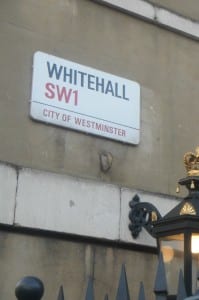 I mentioned in an earlier post that proposed Civil Service reforms were likely to cause tensions between the Government and senior civil servants. The reforms which are being developed by the Cabinet Office Minister, Francis Maude, include proposals to allow Ministers to make more extensive use of special advisers, and also to make senior civil servants directly accountable to Parliament for the work of their departments. These are significant proposals which have begun to attract some attention. Perhaps not surprisingly considerable attention has focused on the proposed expansion in the number of political advisers. The Times which ran with this story on its front page on 19th November, criticised what it described as ‘jobs for cronies’ and the expense involved in employing up to 200 new special advisers.
I mentioned in an earlier post that proposed Civil Service reforms were likely to cause tensions between the Government and senior civil servants. The reforms which are being developed by the Cabinet Office Minister, Francis Maude, include proposals to allow Ministers to make more extensive use of special advisers, and also to make senior civil servants directly accountable to Parliament for the work of their departments. These are significant proposals which have begun to attract some attention. Perhaps not surprisingly considerable attention has focused on the proposed expansion in the number of political advisers. The Times which ran with this story on its front page on 19th November, criticised what it described as ‘jobs for cronies’ and the expense involved in employing up to 200 new special advisers.
However, Maude’s other proposals have attracted less attention, but are no less striking. In particular his proposal to make civil servants accountable to Parliament may fundamentally alter the relationship between Ministers and civil servants and also between Parliament and the Executive. Maude has argued that this is an important means of strengthening accountability. However, the current convention that Ministers are responsible for failings in their department, whether or not they are culpable, is an important means of ensuring that the government is held to account both by Parliament, and through them the public. It could be argued that, as is illustrated by a number of recent cases, including in the Child Support Agency, HM Revenue and Customs and the UK Border Agency, this is a convention which is observed more in the breach. Nevertheless, the notion that civil servants, rather than Ministers, should be called to appear before Parliamentarians to explain the failings of government departments does appear to take this one step further, and could be seen as an attempt to insulate Ministers from blame, and put in place a further barrier to Ministerial accountability to the people they represent.
The proposals have been heavily trailed by Maude in a number of newspaper articles and interviews including this interview in The Financial Times, and a column in this month’s Prospect magazine, in which he has been somewhat critical of the civil service. This prompted a defence of the civil service last week from Lord Butler, the former Cabinet Secretary, who criticised Maude for showing contempt for the civil service. This story seems likely to run for some time yet.
